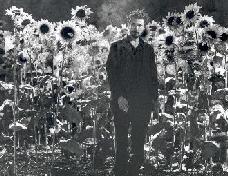SEARCH CurtainUp
REVIEWS
FEATURES
NEWS
Etcetera and
Short Term Listings
LISTINGS
Broadway
Off-Broadway
BOOKS and CDs
OTHER PLACES
Berkshires
London
LA/San Diego
Philadelphia
Elsewhere
QUOTES
On TKTS
LETTERS TO EDITOR
FILM
LINKS
MISCELANEOUS
Free Updates
Masthead
NYC Weather
 London Review
London Review
Platonov
by Lizzie Loveridge
|
I see him (Platonov) as the hero of a Russian novel. And as you know, Russian novels are the worst in the world. . . . No really my point is this: he's a brilliant man. But he exemplifies the modern vagueness, the modern malaise. No point, no purpose. --- Porfiri Glagolyev |

Aidan Gillen as Mikhail Vasilievich Platonov.
(Photo: Ivan Kyncl)
|
In 1923, the six hours of material was discovered, almost twenty years after Chekhov's death, missing its title page . It is thought that Chekhov wrote what was once called Play Without a Title when he was a medical student aged 20. His brother Mikhail transcribed the manuscript and it was offered to the leading actress Maria Nicolaevna Yermolova in the hope of a production at The Maly Theatre in 1881. Yermolova turned it down and the work was abandoned. From 1928 to the 1950s the play was variously staged as Fatherlessness, That Worthless Fellow Platonov, Don Juan (in the Russian Manner) . It was transposed to the American Deep South as Firework on the James and came to New York in 1960 as A Country Scandal. When the Royal Court staged it in London in 1960 with Rex Harrison in the leading role, it took on the title Platonov.
In 1984 Michael Frayn rewrote the play for the National Theatre and its title changed once again -- to Wild Honey. Frayn thought that Platonov was an inaccurate title, as he felt that the play was not about an individual but a group of people and, in any case, only Russian speakers knew how to pronounce Platonov. It should be pronounced Pla-TONE-of.
This brings us to David Hare's adaptation, directed by Jonathan Kent. Unlike some more loose adaptations, Hare has has followed the text as closely as possible, keeping its original structure and plan, but cutting it to just over three hours. He describes his effort as being an undoubtedly a risky undertaking, explaining that . "Platonov may appear an odd shaped play. It can seem like a man who sets off for a walk in one direction, but who is then lured by the beauty of the landscape into another direction entirely".
The plot centres around 27 year old Platonov, (Aidan Gillen) a country schoolmaster, married to the plump and deeply religious Sasha (Frances Grey) who has three other women pursuing him. There is the general's widow, sophisticated, intelligent, loving Anna Petrovna (Helen McCrory); Sofya (Jodhi May) idealistic and newly married to Sergei Voynitzev (Tobias Menzies) and Maria Grekova, (Camilla Power), a student of chemistry. However Platonov is not a traditional seducer of woman but more a man carried along by events who does not resist. The society in which the play takes place is one in a state of flux, where the estate landowners are incapable of keeping their property intact without serfs, where many are getting into debt which they will never pay and where others are profiting by acquiring land cheaply and many use alcohol to blur reality.
It is a sprawling play and the character of Platonov is full of contradictions and an acting nightmare. Aidan Gillen's fast talking lead, his hair gelled into spikes, is dishevelled but not sexually charismatic or even really animated as he delivered his sardonic wit. Helen McCrory shines as the widow Her vocal range is amazing as she switches from little girl to deep, husky woman "smoke me like a cigarette" to highly camp comedienne. Adrian Scarborough is excellent as Nickolai Triletsky, Platonov's brother in law, the dishonest, sleazy doctor who has many comic lines. Most of the small parts merge into similarity and indistinction.
The set is breathtaking. I haven't been so entranced since I walked into the Gainsborough Studios for the Almeida's Richard II. Paul Brown fills the vast stage at King's Cross with a Russian estate. To the right is a field of giant sunflowers through which the cast can enter and be hidden; to the left a forest of white barked silver birch trees, a hammock strung between two trees with a sleeping man. A river runs through the grounds giving reflections of the trees in the water. A Russian wooden house, with intricately carved doorframe sits with its corner facing us. Outside there is a piano and some garden furniture. Later in the play, a railway track rises from the river bed and the light and sound of a locomotive come towards us and into the audience. Jonathan Kent could not have achieved a more atmospheric production.
Platonov will be a must for those who want to complete their viewing of all Chekhov plays. They will accept its flaws and be grateful for the Almeida's ambition in showing this rare play and giving us a glimpse of themes delivered in the great later plays.
Editor's Note: Check out the proflie on Chekov in our playwright's album.
| Platonov Written by Anton Chekhov Adapted by David Hare Directed by Jonathan Kent Starring: Aidan Gillen, Helen McCrory With: Adrian Scarborough, David Ross, Tobias Menzies, Bernard Kay, Arthur Cox, Frances Grey, Jeffry Wickham, Camilla Power, Jodhi May, Sacha Grunpeter, Bruce Purchase, Roger Swaine, Tam Dean Burn, Nicholas Boulton, Edward Macleem, Sam Beazley, Alwyne Taylor, Peter MacKriel. Design: Paul Brown Lighting Design: Mark Henderson Sound: John A Leonard Music: Jonathan Dove Running time: Three hours thirty minutes with one interval Box Office: 020 7359 4404 Booking to 10th November 2001 Reviewed by Lizzie Loveridge based on the 11th September 2001 performance at the Almeida at King's Cross, Omega Place, London N1 |




